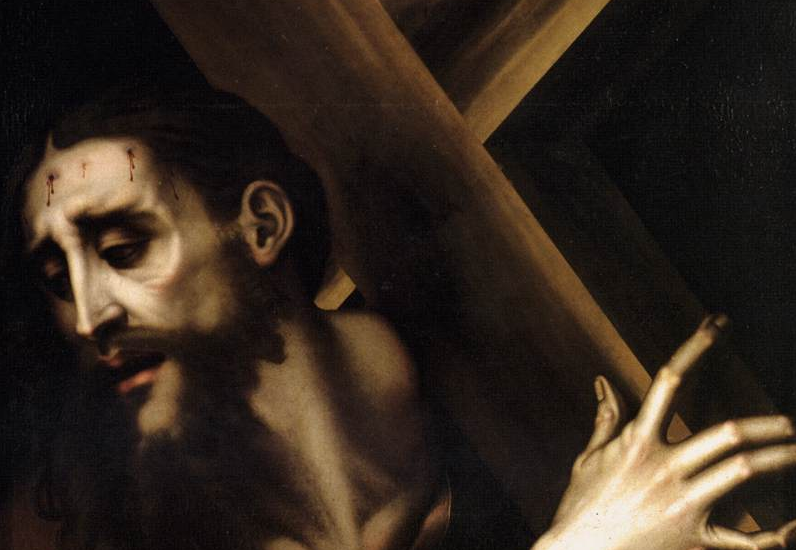Within Christianity, there are several theories of the meaning of the Cross and Resurrection. I think no single theory can fully account for this great mystery, but that each theory gives us a lens that together paint an impressionistic picture. We hear a lot about penal theories of the atonement, from Calvinistic friends, but this is also a theory that, under some forms, is present within Catholic Tradition. And we hear about Christus Victor, which is very important.
The one that isn’t very much in odor of sanctity (ha ha), as far as I can tell, is Moral Influence: the idea that Jesus went to the Cross to exemplify the meaning of morality and influence men’s morality. Moral Influence, as best as I can tell, is under suspicion in many orthodox and/or traditional circles, because it is seen as essentially trivializing the Cross, as making it have no transcendental meaning, and instead a pure historical meaning. It has been used by some progressive Christians to advance a Jesus whose divinity is obscured (if not denied) and whose Gospel is reduced to a moralistic or political message.
Despite that, and with the all-important caveat that I don’t believe Moral Influence is the full story, I do believe it is part of the story. And here’s why.
That is clearly part of the work of the Cross. It seems to me incontrovertible from the Gospel that, at least in part, the Cross really is intended by Jesus to serve as a moral example. When Jesus says “greater love hath no man than this, that a man lay down his life for his friends,” you can almost hear Him add “…and I’ll show you.” Clearly, when a Christian contemplates his moral duty, he should look first to the Cross. I don’t think you can deny that moral influence is part of the meaning of the Cross. I don’t think anybody would disagree with this, but I do think we sometimes tend to take it for granted when we talk about the Mystery of the Cross, and I don’t think Jesus likes it.
Moral Influence does change the world. As y’all know, I am a Girardian. If we look at the Cross through a Girardian lens, we realize that the moral message of the Cross is not “just” an easy-to-sentimentalize message about brotherly love; it is also a profoundly subversive message that shatters the foundations of all cultures and all human institutions and pretentions. If Girard is right that through the Cross of the spotless Lamb, Jesus exposes the scapegoat dynamic at the heart of all civilization and at work within all human rights, and publicly proclaims to the entire world the vacuity of our scapegoat dynamics, that really is a world-changing message. And I would argue along with Girard that the arc of Western Civilization, this arc of history which does bend in many ways towards justice, down to the present day, can be looked at as our processing, without realizing it, in fits and starts, this immensely subversive message.
The moral example is stronger in the context of Christ’s Divine Sonship. I might be caricaturing a little bit, but there’s a sense of, well, people give up their lives for truth/their/friends all the time–if Moral Influence is true, then why is the Cross special? And the answer is: because of Who is on the Cross. If I give up my life for you, while subjectively I am giving up a lot, objectively, in the grand scheme of things, I’m not giving up much. For starters, I know I’m going to die at some point anyway, so why not do it with some panache and meaning (this is a way of thinking that is a little alien to the contemporary West, but wouldn’t have been to most of our forerunners). The difference with Christ is, of course, that he is the Word of God, only-begotten of the Father, dwelling with Him in all eternity. For Jesus to die on the Cross means to give up literally everything. It is literally impossible for us to imagine the “delta”, the difference, between the bliss of the Son living in perfect harmony with the Father in the Trinity, and the suffering of the man Jesus on the Cross. What Jesus “gives up” on the Cross is more than we can ever give up, more than we can even imagine. This is the moral example set by the Cross: Jesus doesn’t just say “give everything”, he says “give more than everything.” Jesus didn’t just die, He died on the Cross, after scourging and humiliation. I find this to be a mystery impossible to contemplate too much.
Moral Influence Theory emphasizes the gratuitous nature of Jesus’ sacrifice on the Cross. Y’all know I have a big of a bone to pick with Penal Substitutionary Atonement, and my main problem with it is that–and, as you know, this is another of my hobbyhorses–it portrays Jesus and God’s actions within a framework of necessity. God’s justice has to be satisfied by punishment of sin, so Jesus had to die to provide satisfaction or else God would have had to condemn us all. Moral Influence, on the other hand, is all about the gratuity of Jesus’ love for us. If we keep in mind what I just wrote above about the unimaginable, absolute, despoilment and pain that Jesus experienced on the Cross, being the Son of God and being deprived of everything, then how much greater is this gift if we think that Jesus did it not because He had to, but just because He wanted to. More than that, just to show us what love looks like.
This theme of the gratuitousness and the generosity of God is an important one, one that we can’t look at enough, and it is particularly present through Moral Influence Theory. Again, I don’t believe it’s the whole story. But I think it’s part of the story and we need to look at it more.

















